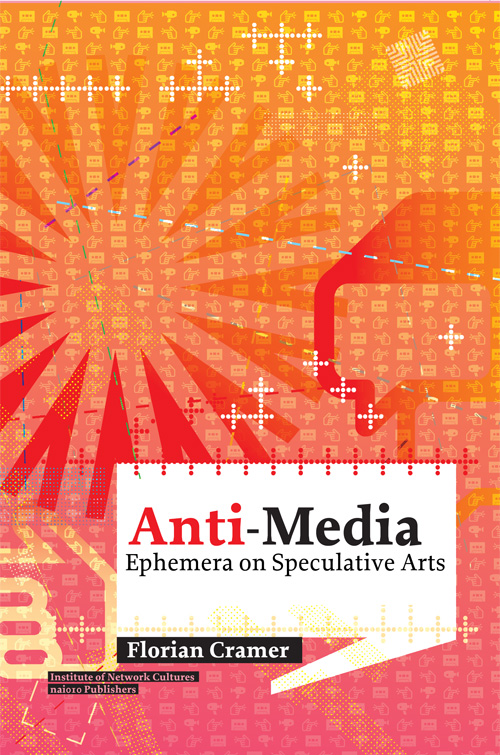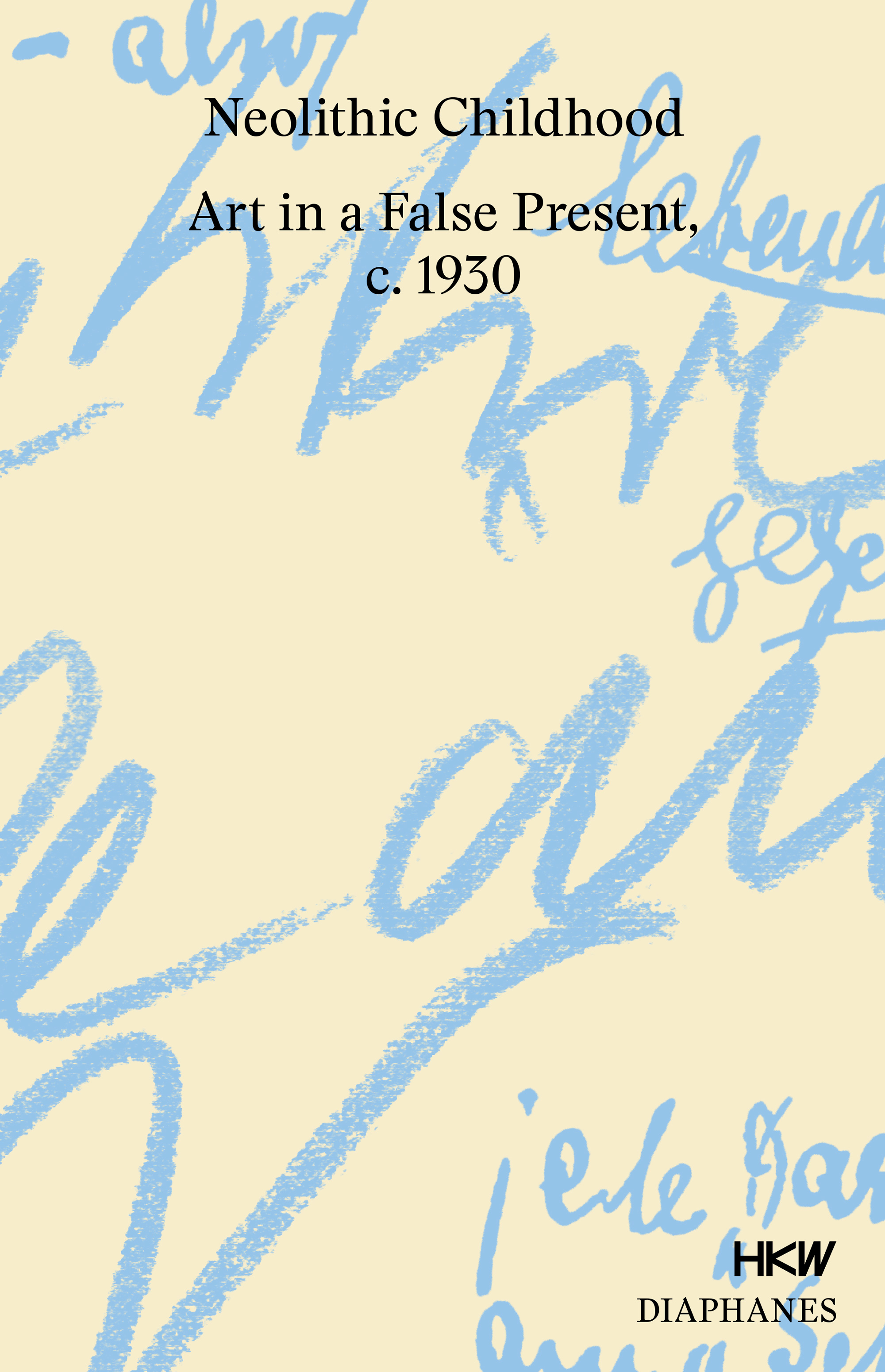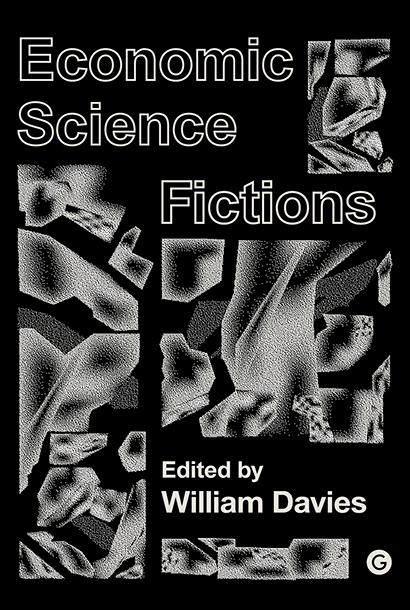Florian Cramer: Anti-Media: Ephemera on Speculative Arts (2013)
Filed under book | Tags: · art criticism, art history, literary criticism, media

“1. There is art, and there is anti-art.
2. If that is so, there must also be anti-media.
3. ‘Media’ as a term is as fuzzy as ‘art’.
4. Both ‘art’ and ‘media’ refuse to go away.
Anti-media is what remains if one debunks the notion of media but can’t get rid of it.
This book reflects on anti-copyright, porn, creative industries, post-punk, Arts and Crafts and constructivism, cooking as contemporary art, Oulipo, post-digitality, mezangelle, Anonymous and 4chan, Fluxus, amateurism, file sharing networks, pop culture, 17th century poetry, electroacoustic music, Neonazi communication guerilla, Rotterdam, romanticism, electronic literature, Mail Art, ontology, Super 8, Rosicrucianism and conceptual art.”
Publisher nai010 publishers, Rotterdam, and Institute of Network Cultures, Amsterdam, 2013
Studies in Network Cultures series
ISBN 9789462080317, 9462080313
260 pages
Reviews: Regine Debaty (We Make Money Not Art, 2013), Alessandro Ludovico (Neural, 2014).
PDF (3 MB)
Comment (1)Anselm Franke, Tom Holert (eds.): Neolithic Childhood: Art in a False Present, c. 1930 (2018)
Filed under book, catalogue | Tags: · art, art history, autonomy, avant-garde, capitalism, formalism, gesture, hallucination, modernism, primitivism, surrealism, totality

“Resonating at the heart of Neolithic Childhood. Art in a False Present, c. 1930 is the question whether art has present, past, and future functions. The modernist assertion of the autonomy of art was intended to render superfluous art’s social and religious functions. But what if the functionlessness of art comes under suspicion of being instrumentalized by bourgeois capitalism? This was an accusation that informed the anti-modernist critique of the avant-garde, and particularly of Surrealism. The objective throughout the crisis-ridden present of the 1920s to the 1940s was to reaffirm a once ubiquitous, but long-lost functionality—not only of art.
The publication accompanying the exhibition examines the strategies deployed in this reaffirmation. These include the surrealist Primitivism of an “Ethnology of the White Man” together with the excavation of the deep time of humanity—into the “Neolithic Childhood” mapped out by the notoriously anti-modernist Carl Einstein (1885-1940) as a hallucinatory retro-utopia. The volume brings together essays by the curators and academics involved in the project, primary texts by Carl Einstein and a comprehensive documentation of the exhibition including lists of works, texts on as well as images of numerous exhibits and finally installation views. At the center of the volume, a glossary discusses Carl Einstein’s own theoretical vocabulary as well as further associated terms, such as Autonomy, Formalism, Function, Gesture, Hallucination, Art, Metamorphosis, Primitivisms, Totality.”
With contributions by: Irene Albers, Philipp Albers, Joyce S. Cheng, Rosa Eidelpes, Carl Einstein, Anselm Franke, Charles W. Haxthausen, Tom Holert, Sven Lütticken, Ulrike Müller, Jenny Nachtigall, David Quigley, Cornelius Reiber, Erhard Schüttpelz, Kerstin Stakemeier, Maria Stavrinaki, Elena Vogman, Zairong Xiang, Sebastian Zeidler.
Publisher Diaphanes, Berlin, and Haus der Kulturen der Welt (HKW), Berlin, 2018
ISBN 9783035801064, 3035801061
460 pages
Exhibition and conference
Publisher
Publisher
WorldCat
PDF (removed on 2018-9-12 upon request from publisher, see a preview of the first 32 pages)
Comment (0)William Davies (ed.) Economic Science Fictions (2018)
Filed under book | Tags: · automation, capitalism, dystopia, economics, economy, luddism, money, neoliberalism, science fiction, utopia

“From the libertarian economics of Ayn Rand to Aldous Huxley’s consumerist dystopias, economics and science fiction have often orbited each other. In Economic Science Fictions, editor William Davies has deliberately merged the two worlds, asking how we might harness the power of the utopian imagination to revitalise economic thinking.
Rooted in the sense that our current economic reality is no longer credible or viable, this collection treats our economy as a series of fictions and science fiction as a means of anticipating different economic futures. It asks how science fiction can motivate new approaches to economics and provides surprising new syntheses, merging social science with fiction, design with politics, scholarship with experimental forms.
With an opening chapter from Ha-Joon Chang as well as theory, short stories, and reflections on design, this book challenges and changes the notion that economics and science fiction are worlds apart. The result is a wealth of fresh and unusual perspectives for anyone who believes the economy is too important to be left solely to economists.”
Contributors: AUDINT, Khairani Barokka, Carina Brand, Ha-Joon Chang, Miriam A. Cherry, William Davies, Mark Fisher, Dan Gavshon Brady, Owen Hatherley, Laura Horn, Tim Jackson, Mark R. Johnson, Bastien Kerspern, Nora O Murchú, Justin Pickard, James Pockson, Tobias Revell, Judy Thorne, Sherryl Vint, Georgina Voss, Jo Lindsay Walton, Brian Willems.
Publisher Goldsmiths Press, London, 2018
ISBN 9781906897680, 1906897689
xiv+383 pages
Reviews: Anna Nguyen (LSE Review of Books, 2018), Justin Reynolds (New Socialist, 2018).
PDF (15 MB)
Comment (0)
